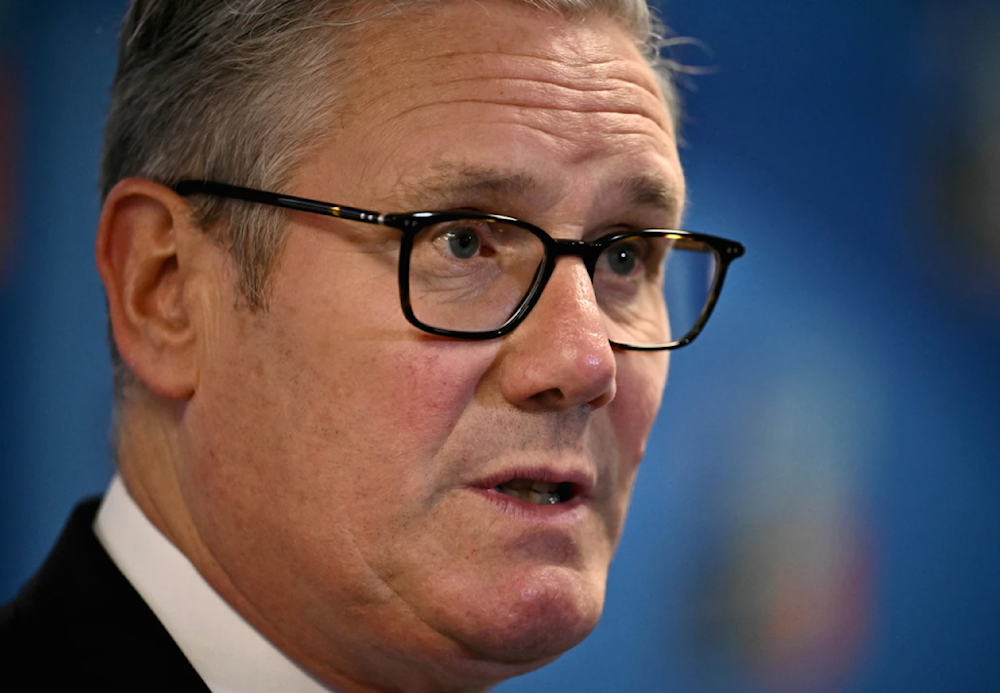Anti-arms groups plan mass protests over UK nuclear expansion
The UK’s plan to acquire US-made nuclear-capable F-35A fighter jets has sparked fierce backlash from anti-nuclear campaigners.
-

Britain's Prime Minister Keir Starmer speaks to the media as he arrives for the NATO summit of heads of state and government in The Hague on June 25, 2025 (AP)
The UK is facing a new wave of anti-nuclear protests as campaigners react to what they call the largest expansion of Britain’s nuclear deterrent in a generation. Activists warn the move puts the country on the “nuclear frontline” and could spark protests on a scale not seen since the Greenham Common peace camp of the 1980s.
At the heart of the controversy is the UK government's plan to purchase 12 US-made F-35A fighter jets, aircraft capable of carrying both conventional weapons and the B61-12 gravity bomb, a modernized US nuclear weapon with more than triple the explosive force of the Hiroshima bomb. The Campaign for Nuclear Disarmament (CND) and Campaign Against Arms Trade (CAAT) argue that the decision, made without parliamentary debate, undermines democracy and poses a grave risk to public safety.
UK Prime Minister Keir Starmer is expected to announce the decision during the NATO summit in the Netherlands, where he will call on fellow NATO members to reinforce their commitment to the alliance.
In a press release, he emphasized the importance of strengthening national security in a time of growing global instability, stressing, "In an era of radical uncertainty, we can no longer take peace for granted, which is why my government is investing in our national security."
Protest plans amid growing public backlash
CND is organizing a protest this Saturday at RAF Lakenheath, a US-operated base in Suffolk, which is undergoing major upgrades and houses storage vaults historically used for nuclear weapons. Campaigners believe it is likely to become the first UK site to host US nuclear arms since their withdrawal in 2008.
“This move puts us on the nuclear frontline,” said CND general secretary Sophie Bolt. “It means that there’s going to be at least one if not two bases now in Britain that will be stationing US nuclear weapons and US capable jets. That puts us on the frontline and it doesn’t offer us any protection.”
Bolt warned that the stationing of US nuclear weapons at RAF Lakenheath, and potentially RAF Marham in Norfolk, marks a dangerous turning point in UK defence policy. “This is being done without any parliamentary debate or vote and completely undermines British democracy. It undermines British sovereignty and of course that impacts Britain’s economic priorities.”
The UK has not operated its own air-launched nuclear weapons since 1998, and US nuclear arms were removed from Lakenheath in 2008. The new F-35A jets signal a significant reversal, and critics argue this shift undermines the UK’s commitment under Article 6 of the 1970 Non-Proliferation Treaty, which obliges nuclear-armed states to pursue disarmament in good faith.
Defense Secretary John Healey denied the expansion represented a return to Cold War posturing, insisting the move aligns with the UK’s nonproliferation obligations.
But Bolt dismissed those claims as “double speak", saying, “How on earth can buying nuclear-capable jets which can carry nuclear bombs help bring about the end of nuclear weapons. It’s just total hypocrisy.”
UK to dramatically increase weapons production
On a related note, earlier this month, the UK said it planned to invest $2 billion in building new weapons factories as part of a major rearmament initiative, Defense Secretary John Healey announced.
The plan included constructing at least six new facilities to produce munitions and explosives and acquiring over 7,000 domestically manufactured long-range weapons, such as drones and missiles. Healey also committed to increasing defense spending to 3% of GDP by 2034.
“The hard-fought lessons from [Russian President Vladimir] Putin’s illegal invasion of Ukraine show a military is only as strong as the industry that stands behind it,” Healey said.
“We are strengthening the UK’s industrial base to better deter our adversaries and make the UK secure at home and strong abroad," he further added.

 4 Min Read
4 Min Read








